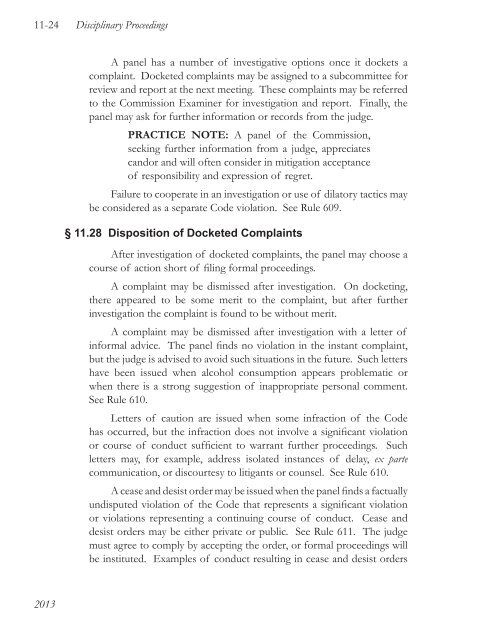CHAPTER 11 - Disciplinary Proceedings - Kansas Judicial Branch
CHAPTER 11 - Disciplinary Proceedings - Kansas Judicial Branch
CHAPTER 11 - Disciplinary Proceedings - Kansas Judicial Branch
You also want an ePaper? Increase the reach of your titles
YUMPU automatically turns print PDFs into web optimized ePapers that Google loves.
<strong>11</strong>-24 <strong>Disciplinary</strong> <strong>Proceedings</strong><br />
A panel has a number of investigative options once it dockets a<br />
complaint. Docketed complaints may be assigned to a subcommittee for<br />
review and report at the next meeting. These complaints may be referred<br />
to the Commission Examiner for investigation and report. Finally, the<br />
panel may ask for further information or records from the judge.<br />
PRACTICE NOTE: A panel of the Commission,<br />
seeking further information from a judge, appreciates<br />
candor and will often consider in mitigation acceptance<br />
of responsibility and expression of regret.<br />
Failure to cooperate in an investigation or use of dilatory tactics may<br />
be considered as a separate Code violation. See Rule 609.<br />
§ <strong>11</strong>.28 Disposition of Docketed Complaints<br />
After investigation of docketed complaints, the panel may choose a<br />
course of action short of filing formal proceedings.<br />
A complaint may be dismissed after investigation. On docketing,<br />
there appeared to be some merit to the complaint, but after further<br />
investigation the complaint is found to be without merit.<br />
A complaint may be dismissed after investigation with a letter of<br />
informal advice. The panel finds no violation in the instant complaint,<br />
but the judge is advised to avoid such situations in the future. Such letters<br />
have been issued when alcohol consumption appears problematic or<br />
when there is a strong suggestion of inappropriate personal comment.<br />
See Rule 610.<br />
Letters of caution are issued when some infraction of the Code<br />
has occurred, but the infraction does not involve a significant violation<br />
or course of conduct sufficient to warrant further proceedings. Such<br />
letters may, for example, address isolated instances of delay, ex parte<br />
communication, or discourtesy to litigants or counsel. See Rule 610.<br />
A cease and desist order may be issued when the panel finds a factually<br />
undisputed violation of the Code that represents a significant violation<br />
or violations representing a continuing course of conduct. Cease and<br />
desist orders may be either private or public. See Rule 6<strong>11</strong>. The judge<br />
must agree to comply by accepting the order, or formal proceedings will<br />
be instituted. Examples of conduct resulting in cease and desist orders<br />
2013

















